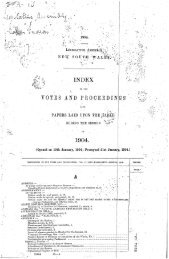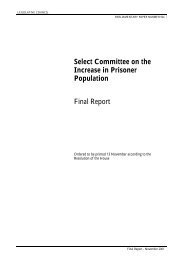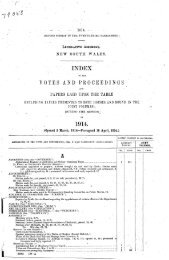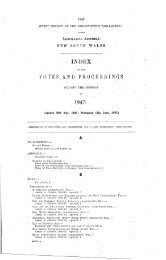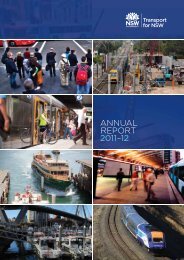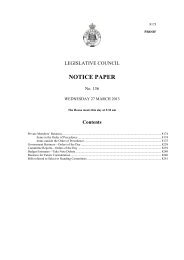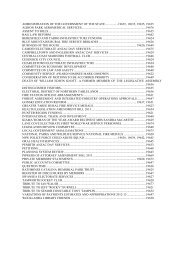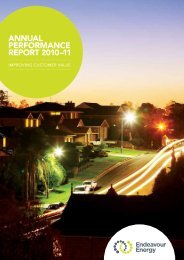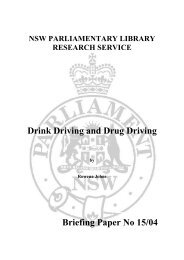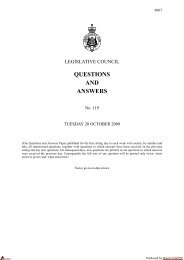Questions & Answers Paper No. 158 - Parliament of New South ...
Questions & Answers Paper No. 158 - Parliament of New South ...
Questions & Answers Paper No. 158 - Parliament of New South ...
You also want an ePaper? Increase the reach of your titles
YUMPU automatically turns print PDFs into web optimized ePapers that Google loves.
7098<br />
LEGISLATIVE ASSEMBLY QUESTIONS AND ANSWERS<br />
MONDAY 12 OCTOBER 2009<br />
• NSW Nanotechnology Policy Co-ordination<br />
• Screen NSW Board<br />
• Board <strong>of</strong> Tourism NSW<br />
• Tourism Planning & Investment Taskforce<br />
• Tourism & Education Taskforce<br />
• <strong>New</strong> <strong>South</strong> Wales Innovation Council<br />
• Regional Development Australia committees<br />
• Small Business Development Corporation <strong>of</strong> <strong>New</strong> <strong>South</strong> Wales<br />
*7489 SCHOOL LEARNING SUPPORT PROGRAM—Mr Richard Torbay asked the Minister for Education<br />
and Training, and Minister for Women—<br />
(1) Will parents be better informed and consulted regarding how the proposed new School Learning<br />
Support Program will affect those students with mild disability and learning needs entitled to up to<br />
$6000 support under the current system?<br />
(2) What are the reasons for the proposed changes and will these students still receive support in<br />
mainstream classes at the same, or a higher, level than under the current system?<br />
(3) (a) How will the proposal to replace itinerant specialist teachers with generalist teachers based in<br />
schools produce better outcomes for students?<br />
(b) Will students still have access to specialist expertise if that is considered necessary?<br />
(c) How does the department propose to train the decision makers necessary under the proposed<br />
model to the level <strong>of</strong> competence that pr<strong>of</strong>essionals have acquired over 5-10 years <strong>of</strong> education,<br />
training and experience, which is the basis <strong>of</strong> the current model?<br />
(4) How will the Department <strong>of</strong> Education deal with students moving schools and guarantee each<br />
student will receive the same level <strong>of</strong> support they received in the previous school, particularly in<br />
circumstances where they move to a school with an enrolment <strong>of</strong> less than 160, from a school where<br />
the enrolment is greater than 160?<br />
(5) Under the proposed model, how will the Department <strong>of</strong> Education maintain accountability to the<br />
various stakeholders including parents and students?<br />
Answer—<br />
(1) The proposed School Learning Support Program is currently the subject <strong>of</strong> consultation with key<br />
groups including principals, parents, advocacy groups and unions which will continue until the<br />
middle <strong>of</strong> 2010, while the proposal is trialled in two regions. An evaluation <strong>of</strong> the existing School<br />
Learning Support Coordinator initiative is also currently underway.<br />
The Department <strong>of</strong> Education and Training aims to provide all parents with comprehensive<br />
information about the proposed model.<br />
<strong>No</strong> decision about the future <strong>of</strong> this proposal will be made until the consultations, trials and<br />
evaluation are finalised.<br />
(2) The aim <strong>of</strong> the proposed new program is to establish a specialist teacher presence in every school<br />
across the state to provide greater in-school support to students with additional learning needs and<br />
their class teachers.<br />
(3) (a) The proposal does not seek to replace specialist teachers with generalist teachers but to place<br />
specialist itinerant teachers directly in schools. The proposed model will give school principals<br />
increased flexibility to use available resources to support the additional learning needs <strong>of</strong> students.<br />
(b) Yes.<br />
(c) Principals are responsible for leading decision making in schools. They have high levels <strong>of</strong><br />
expertise and are supported by school education directors. This proposal supports principals by<br />
providing access to high quality pr<strong>of</strong>essional learning for School Learning Support Teachers.<br />
(4) Under the proposed model, resources would be allocated directly to schools using a fair allocation<br />
formula that takes into account school enrolments and student learning need. As a result, a student<br />
enrolling with additional learning needs will have access to support in every school without requiring<br />
confirmation <strong>of</strong> a disability and without delay through administrative processes.<br />
(5) The Department has a range <strong>of</strong> accountability mechanisms in place that will continue under the<br />
proposed model.<br />
The progress <strong>of</strong> all students is monitored by the classroom teacher and reported to parents in<br />
accordance with the Department's Curriculum planning and programming, assessing and reporting<br />
K-12 policy. Parents and carers receive a plain English report <strong>of</strong> each student's progress twice a year.<br />
Produced by Alts<strong>of</strong>t Xml2PDF



